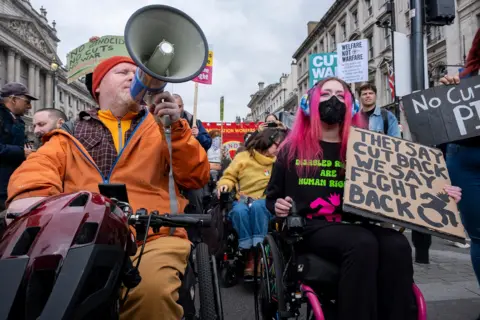Starmer changes tone in bid to win back Labour MPs
 PA Media
PA MediaOn Wednesday, Sir Keir Starmer insisted that he would plough on with the government's proposed welfare reforms.
For Labour MPs, that only made things worse.
Today's task for the prime minister and his team: make things better.
The clear change of tone right from the start of the day was the first sign of that change.
It was reinforced by Sir Keir in the Commons, who said that he recognised MPs of all parties were "eager" to reform the "broken" welfare system.
"We want to see reform implemented with Labour values and fairness," he said.
He said talks with Labour rebels would continue in the "coming days", ahead of the scheduled vote next week on legislation to deliver the proposals.
The bill tightens eligibility requirements for personal independence payments (Pips), halves the health-related element of universal credit (UC), and increases the UC standard allowance. These reforms aim to save £5bn a year by 2030.
Two areas where the talks will focus are the eligibility criteria for Pips, and the proposed cuts to the health-related elements of UC.
These are sensitive matters at the heart of the welfare package. But the government simply needs to find a way to get to, and through, the vote on Tuesday.
Take a step back, and this is apocalyptic territory for a government which won a vast landslide less than a year ago.
Spending the week speaking to Labour MPs and officials has been quite staggering. Invective is being sprayed everywhere.
At the heart of this rebellion is the unease in the Labour Party, which spreads right across all factions and none, about cuts to the generosity of the welfare state.
For so many Labour MPs, that safety net, and a passionate commitment to it, form their irreducible core.
 Getty Images
Getty ImagesFrustrations with No 10
But the rebellion has also no doubt been fuelled, catalysed and exacerbated by other latent frustrations among Labour MPs.
Among them is a view that Starmer's Downing Street operation doesn't listen to them.
Frustration at the political handling of the welfare row is being directed with increasing intensity at Morgan McSweeney, the prime minister's chief of staff, as well as his political secretary, Claire Reynolds.
Of course, McSweeney is Starmer's second chief of staff in Number 10.
His predecessor, Sue Gray, was removed after only three months.
The first-ever Downing Street chief of staff was Jonathan Powell, who held the role for Sir Tony Blair for a decade. He's now back as Starmer's national security adviser.
But one Labour insider suggested that the anger at the Downing Street operation was displacement activity for the real culprit.
"He could make Jonathan Powell his chief of staff, and it wouldn't make up for the fact that it's the prime minister who doesn't have enough political nous."
And perhaps there's something more fundamental at play here in our political culture.
Boris Johnson won what was then considered to be a massive majority - 80 - in 2019, and we assumed he could get to do what he wanted for five years.
That turned out not to be the case, to say the least.
In 2024, Sir Keir Starmer won a majority of double that – and here he is in a serious crisis.
I asked a government minister how things had come to this point so fast.
Their reply: "This is the new reality of our volatile politics."

